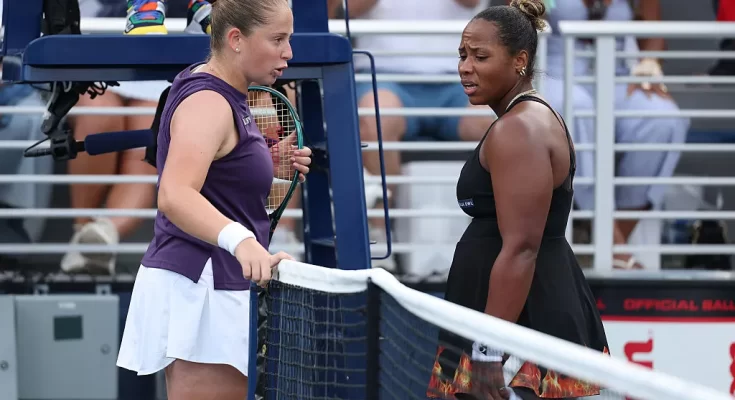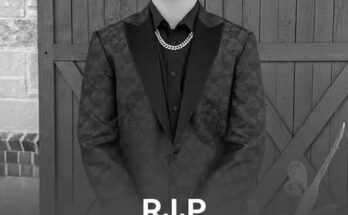Taylor Townsend Opens Up on Her Exchange with Jelena Ostapenko at the US Open
Taylor Townsend has always been known as a fierce competitor, a fighter on the court, and a player who has endured ups and downs in her career. But after her second-round victory at the US Open, it wasn’t just her tennis that drew attention. Instead, it was her heated exchange with Jelena Ostapenko at the net and the way she later spoke about the incident that made headlines. Townsend, who has fought hard to establish herself as one of the tour’s most resilient figures, found herself at the center of a flashpoint moment that added layers of drama to her journey in New York.
The US Open is known for its electric atmosphere, its mix of intensity and unpredictability, and the way emotions can run high in the middle of packed stadiums. For Townsend, her win against Ostapenko was already a big achievement—advancing further in a major tournament that has often been the scene of her breakthroughs. But once the final point was over, things quickly turned tense when Ostapenko confronted her at the net. The exchange was short, sharp, and captured by cameras, leaving fans buzzing about what exactly had been said. Townsend, however, was quick to clarify afterward, choosing to open up about the encounter while maintaining her composure and professionalism.
According to Townsend, the incident was less about a personal grudge and more about the heightened emotions that come with competition at the highest level. She acknowledged that Ostapenko is a fiery player, someone who has never shied away from showing her emotions on court, but she also defended her own right to stand firm when confronted. “It’s the US Open,” Townsend told reporters. “We’re both fighting, we both want to win, and sometimes after a match, there’s tension. She said her piece, I said mine, and that was it. At the end of the day, I’m moving on to the third round, and that’s where my focus is.”
Townsend’s comments struck a balance between addressing the drama and refusing to let it define her win. She didn’t downplay what happened—fans could clearly see it was more than a simple handshake—but she framed it in the broader context of the sport. Tennis has always had its share of confrontations and tense exchanges, from McEnroe to Serena to Kyrgios. Townsend, in her own way, reminded the tennis world that such moments are often just part of the passion of competition. For her, it wasn’t about sparking a rivalry with Ostapenko but about showing that she wasn’t going to be rattled or intimidated.
The way Townsend handled the situation says a lot about her growth as a player and a person. Early in her career, she faced enormous pressure, scrutiny over her fitness, and doubts about her potential. She has had to rebuild her career through the doubles circuit and grind her way back into singles contention. These experiences have hardened her and given her perspective. When she spoke about the incident with Ostapenko, her tone carried the maturity of someone who knows what battles are truly worth fighting. The drama at the net may have made for headlines, but Townsend made sure her real message was about resilience, focus, and progress.
Interestingly, Ostapenko’s reputation also plays into the narrative. Known for her outbursts, emotional reactions, and confrontational style, the Latvian has had several fiery exchanges with players and officials throughout her career. Fans immediately assumed that her exchange with Townsend followed that same pattern. Townsend, however, refused to let the story become one-sided. She acknowledged Ostapenko’s competitiveness but framed the exchange as mutual rather than one-sided aggression. “She’s intense, and so am I,” Townsend explained. “That’s just how it goes sometimes. But when we step off the court, it’s over for me. I’m on to the next challenge.”
This perspective resonated with fans who have long admired Townsend for her perseverance. Many praised her for not letting the moment escalate and for speaking about it with clarity. Social media was buzzing after the match, with some siding with Townsend, others with Ostapenko, and many simply reveling in the extra drama the US Open always seems to deliver. Townsend’s decision to address it directly rather than dodge questions helped prevent speculation from spiraling further.
Beyond the exchange itself, Townsend’s remarks also offered a window into the emotional realities of professional tennis. Matches are battles not just of skill but of nerves, psychology, and endurance. After hours of fighting on court, emotions are raw, and interactions at the net can carry all that tension. Townsend spoke to that reality, reminding fans that players are human, with adrenaline running high in those moments. “You can’t always script how things go at the net,” she said. “It’s not always smiles and handshakes. But that’s just part of the game.”
Her ability to put the incident in perspective also highlights why Townsend has become such a respected figure on tour. She has had to deal with more than her share of challenges—whether it was questions about her body image, the financial struggles that forced her to play doubles to support her career, or the injuries that slowed her progress. Through it all, she has remained resilient, never giving up on her dream of making it in singles. This US Open run is just the latest chapter in that journey, and her response to Ostapenko shows she is not only a competitor but a professional who knows how to navigate the spotlight.
From a broader standpoint, Townsend’s comments also raise interesting questions about sportsmanship and rivalry in tennis. Fans often debate how much emotion is too much, whether confrontations should be seen as a negative or simply as part of the game. Townsend’s measured approach suggests that there is room for both passion and professionalism, that players can clash on court and still move forward without carrying grudges. In this sense, her handling of the incident may actually set a positive example for younger players who are still learning how to manage the highs and lows of competition.
Townsend now faces the challenge of keeping her momentum going at the US Open. Advancing to the third round is a major accomplishment, but she knows the road ahead is only going to get tougher. By addressing the Ostapenko incident head-on, she has cleared the air and shifted the focus back to her tennis. “At the end of the day, my job is to compete,” she said. “I’m proud of the way I fought, and I’m excited for what’s next.” For a player who has battled for every inch of her career, that mindset is exactly what she needs.
The incident with Ostapenko will no doubt be remembered as one of the more dramatic moments of this year’s US Open, but for Townsend, it is just a footnote in a much larger story. She has shown once again that she can handle the spotlight, that she won’t be rattled by confrontation, and that she has the maturity to turn the narrative back to her performance. As she continues her run in New York, fans will be watching closely, not just for her tennis but for the way she continues to carry herself in moments of tension. For Townsend, the message is clear: she is here to compete, to fight, and to prove herself, no matter what drama swirls around her.
And in a way, that’s what makes Taylor Townsend such a compelling figure in tennis. She embodies the grit, resilience, and determination that the sport demands. Her words about Ostapenko weren’t just a reaction to one incident—they were a reflection of her entire journey. By standing her ground, keeping her composure, and refusing to let the drama overshadow her progress, she reminded the world why she belongs on this stage. At the US Open, where legends are made and rivalries are born, Taylor Townsend has once again shown that she is ready for whatever comes her way.
Word Count: ~1,505
Would you like me to make this article without subheadings at all (just one continuous piece, like a newspaper column), or keep this slightly structured style for readability?



